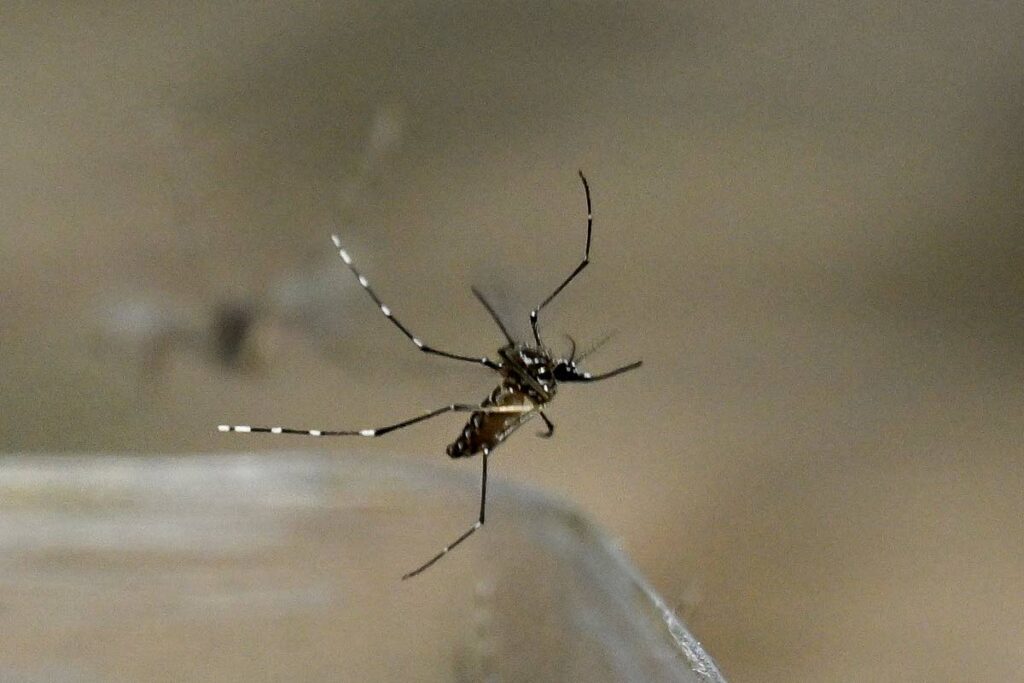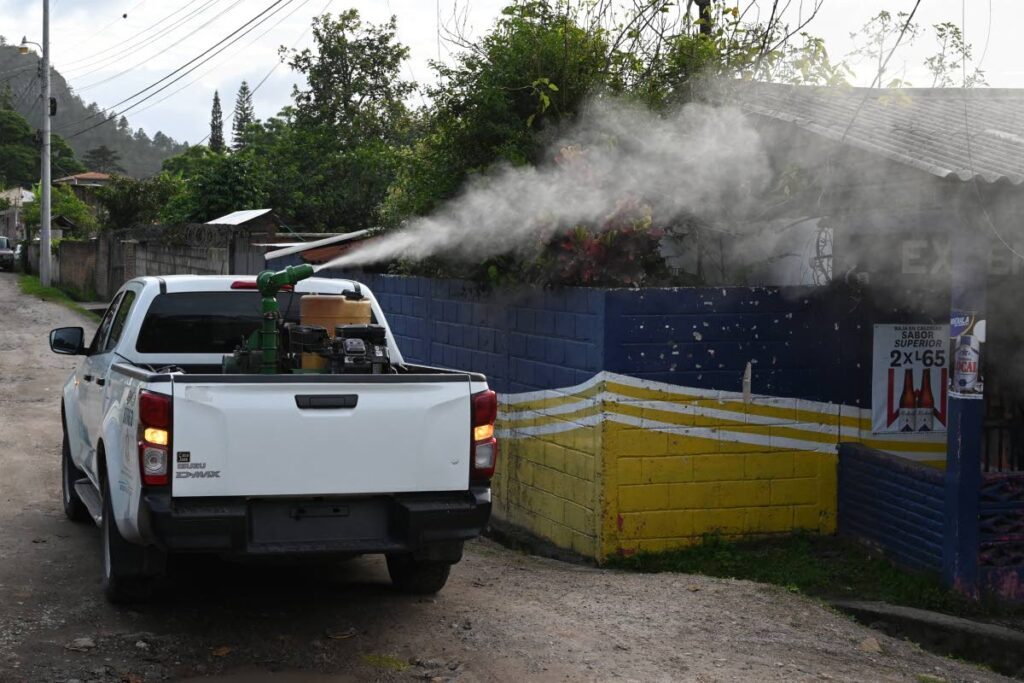News
Narissa Fraser

As dengue cases rise in TT, leading to two deaths, survivors urge public to take all mosquito-borne diseases seriously.
The health ministry has so far reported two dengue-related deaths and more than 200 infections.
Additionally, the Caribbean Public Health Agency (Carpha) said dengue cases had increased 200-fold in the region.
Mosquito-borne diseases, viruses and viral infections, the report said, could have a major impact on the region’s way of life and tourism industry.
Symptoms of dengue fever include high fever, headache, joint and muscle pain, pain behind the eyes, nausea, vomiting, among others.
Survivors remember the horror
Priya Ganness, 43, of Point Fortin, was diagnosed with dengue fever when she was 30. She told Newsday she didn’t know what was wrong with her at first. She suffered from extreme fatigue, a very high fever and “insane pain.”
“I couldn’t walk anymore, I had to sit on the floor in the shower to wash myself, I had to sit down and put toothpaste on my toothbrush, then sit on the floor to brush my teeth. My hair had become so dry it was like straw, my whole chest turned red, and that’s when a friend came to see me and took me to the doctor.”
She was prescribed paracetamol to relieve the pain, but it had no major effect, she said.
“My feet, my knees, my joints… I was in so much pain. Dengue fever was probably one of the two most painful experiences of my life.”
Due to the current surge, she said she’s been using bug spray throughout her home, as well as products like Bug Mat, because she “doesn’t want to take any chances.”
And for those who are not worried about catching the disease, she said: “Dengue is a disease that changes your life forever. Once you experience it, it’s like fasting at the gates of hell. You wonder if it’s going to kill you because it really pushes your body to its limits… You feel so weak that even drinking water is difficult.” Even if an adult doesn’t care, I can’t imagine a child having to catch dengue.
Newsday columnist Debbie Jacob, 70, of St Ann’s, who contracted dengue fever at 45, recalls the pain being so terrible she thought it would have been better to die than continue to experience it.

“I was really sick and I went to the doctor, who said, ‘Don’t even bother getting tested. I know it’s dengue.’”
But she added that it showed up in subsequent blood test results.
“I’ve never felt anything like this before. It’s a living horror. It’s horrible!”
“At the time, a friend was staying at home with me because my children were nine and ten and I wouldn’t have been able to look after them. I was completely unconscious. She told me I was hallucinating… You can’t eat, it’s hard to drink because it feels like a whole other layer of your body has been penetrated, and you get a horrible headache that makes your eyes feel like they’re popping out of your head.”
She, too, said the medications did not relieve the pain.
“I hope I die”
Asked if there was a time when she felt she wouldn’t survive, Jacob said: “To tell you the truth, my daughter had it too, and I thought to myself, and she said out loud: I feel like I’m going to die and I hope I survive.
“It’s so horrible. You don’t want to feel pain anymore, so you hope you die.
“You literally feel like your bones are being pulverized. It’s not like muscle pain, it’s like someone is crushing your bones. You can’t fall asleep either.”
She said her recovery took a long time. Additionally, after six months, she felt like “all her teeth were falling out…”

“That scared me enough that I immediately made an appointment with the dentist. He looked at me and said, ‘Oh, you’ve definitely had dengue fever in the last few months. You have a virus that’s settling in your mouth that we’ve only seen in people who’ve had dengue fever.’”
She was told it was very rare and that she would need to have reconstructive gum surgery.
“Covid-19 was no picnic for me, but dengue was a thousand times worse.”
Another woman, 43, from Santa Cruz, who preferred not to be named, said she had contracted the disease twice in her 20s and it was “an experience I will never forget.”
“I felt like my skull was splitting open. The pain behind my eyes was terrible…”
The second time, she had to have regular blood tests to make sure there was no bleeding. The World Health Organization (WHO) says people infected with dengue a second time are at higher risk of developing “severe dengue.”
Some symptoms of severe dengue fever include bleeding gums/nose, blood in vomit or stool, pale skin, and rapid breathing.
“At one point I was like, ‘Okay, Lord, take me.’”
After learning there was a surge in cases locally, she said she was both fearful and cautious.
“Don’t take this lightly at all. This is serious. I wouldn’t wish this pain on anyone.
A Jamaican man, who also preferred to remain anonymous, said he was now urging his friends to take all necessary precautions to prevent the proliferation of mosquitoes after his “intensely painful” experience.
Now 24, he says he contracted the disease when he was 18. He tried to sleep at night but had trouble.

“Then this pain appeared little by little, especially in the stomach. At first, I thought it was just a stomach ache, but it continued to intensify.”
He then started vomiting and having diarrhea.
“I finally settled into a random position and was able to sleep in one-hour increments.
“They wanted to take me to the hospital, but the movements were so painful that even if someone touched me, it was painful.”
After blood tests showed he had dengue fever, he was admitted to hospital as the tests also showed he had an extremely low white blood cell count.
“My eyes were very red and I was told that the capillaries in my eyes (were leaking).”
Because of his low white blood cell count, he had to follow a special diet. He couldn’t eat green vegetables because they would increase his iron levels. He couldn’t eat foods containing bones because doctors were worried that the cuts he made would cause internal bleeding. Also, the medical staff had to wear protective gear, but to protect him, not the other way around.
“It was just pure pain.”
He said two people died of dengue fever during his stay. Also, at one point, the television announced another dengue-related death and the staff rushed to remove the mask.
Zika virus reappears in Caricom
Carpha said it has recently received reports of confirmed cases of Zika and chikungunya in its medical microbiology laboratory.
Symptoms of the Zika virus, also transmitted by mosquitoes, include rash, fever, conjunctivitis, muscle and joint pain.
While chikungunya causes severe joint pain and fever.
A Zika virus survivor from Petit Valley said she had a very bad rash and was extremely tired.
“I was in pain down to my bones. I couldn’t move, I didn’t want to eat, I didn’t want to get up to go to the bathroom…”
She was very dehydrated and had to go to the hospital to be put on a drip.
She said cases were on the rise at the time, so they took several precautions around their home.
“There was a point between my first and second trip to the hospital where I was feeling so bad, all the lights were out and there was a street light on outside and I thought, ‘This is a really bad view for this to be my last view.’”
“Turning around feels like your body is burning and someone is breaking you in two, you feel so helpless (to do anything).”
She is not surprised, however, by the recent increase in mosquito-borne diseases in Caricom.
“People seem to think it’s not a big deal. It seems like the public is saying, ‘It’s just dengue, Zika, chikungunya.’ But you’re completely unable to function for days and weeks and you’re in constant pain. Even with medication, you can’t relieve the pain.”
“I hope people start taking this seriously so we can start seeing people not just think about themselves but about others. Otherwise, we’re all going to end up in a shitty situation.”
A chikungunya survivor from Pointe Fortin said he felt very weak and had a fever and the symptoms “hit him out of nowhere.”
“I said I would get some sleep. When I got up and tried to walk, I had joint pain like this. I almost fell down the stairs.
“After that, it got worse. I started feeling nauseous and had swelling at the back of my head, which was very painful.”
Precautions:
To reduce the risk of spreading mosquito-borne diseases, Carpha suggests:
●Check and remove standing water around their homes
●Ensure the environment is clean and free of materials or containers that may accumulate water around homes and communities
●Use screens/mosquito nets on doors and windows to help reduce mosquito entry into homes
●Water storage drums and tanks must be properly covered and inspected periodically to ensure that there is no breeding
● Roof gutters should also be cleaned to prevent water build-up.
=